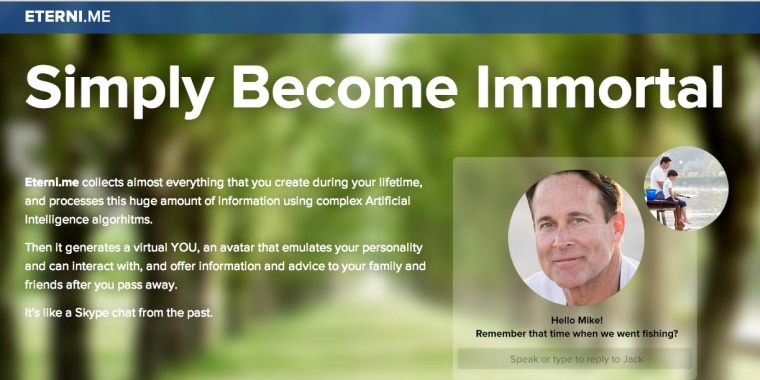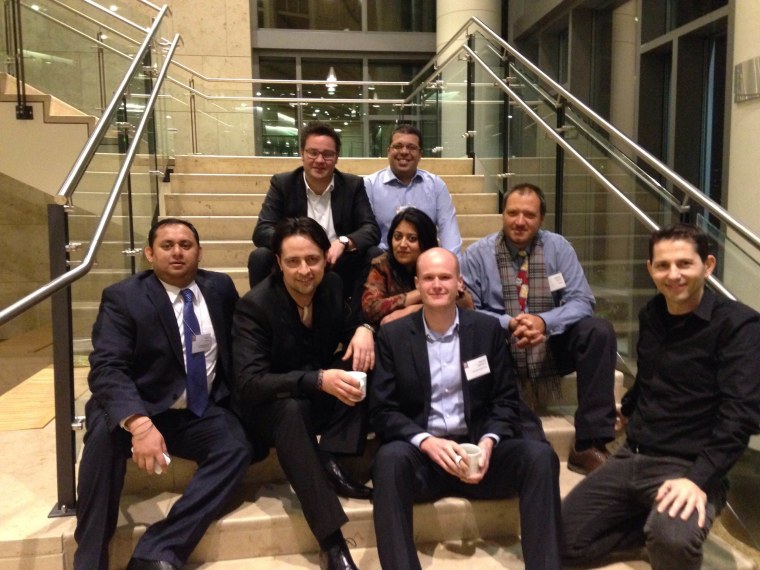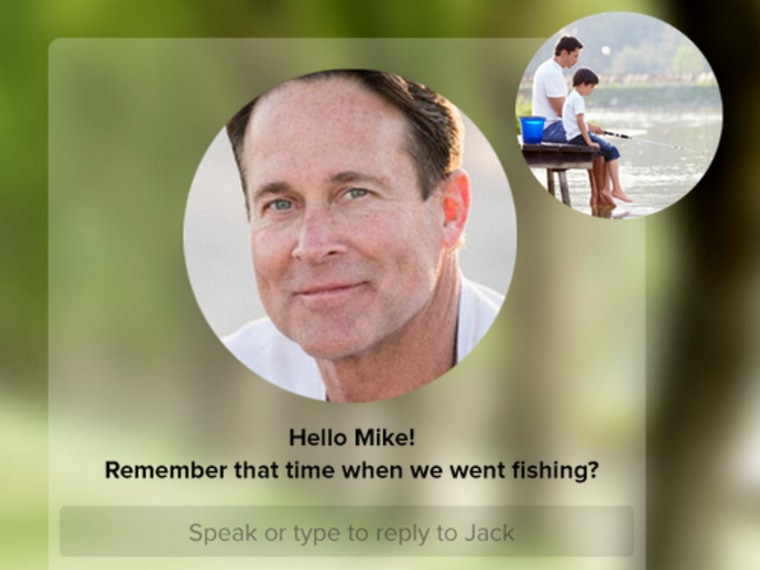
Life-logging is all the rage for today's 20- 30- and 40-somethings. But what happens to all that digital data when they die?
One group of entrepreneurs thinks the secret to immortality lies in a digital time capsule of carefully curated memories and experiences — and all your Facebook likes — outfitted with an Artificial Intelligence (AI) curator to make sense of it all.
Eterni.me, which invites users to "Simply Become Immortal" opened to the world at 1 p.m. U.S. ET on Wednesday, promising to deliver an AI-powered "Skype chat from the past," for loved ones of a person that's passed on. The website's had 40,000 visitors as of noon on Thursday, 1,500 of which want to get regular updates by email.
"Either it’s people thinking it’s creepy and don’t really buy it or they’re interested in learning more," Nicholas Lee, a Canadian entrepreneur and a member of the founding team told NBC News.

The international team of 8 who met in Cambridge for the first time this Sunday, decided to use technology to solve an age-old problem. People are still worried about leaving behind a legacy — memories, wisdom, experiences, for the people they loved, the team confirmed in a brief local survey.
"Right now we’re tying to solve a pretty pragmatic problem," Marius Ursache, a 36-year old from Romania who has founded one company, told NBC News. "It’s the fear of not existing any more. This responds to that need."
The system doesn't exist yet, but the idea is that a person can upload fragments of memories, photos, maybe even advice. Eterni.me will digest that to "generate a virtual YOU, an avatar that emulates your personality and can interact with, and offer information and advice to your family and friends after you pass away," according to the description on the new website.
The target market for this application is 30- to 35-year-olds, early adopters of technology who leave "leave a digital trail." Ursache and Lee clarify that the service will be less of a virtual existence beyond the grave, and more of a way to for the still-living to document aspects of their lives for great grandchildren they perhaps will never meet. The team is very sensitive about creating a useful product that's "beyond being creepy," they say.
Avatars that can serve as convincing stand-ins for people you know don't yet exist, at least not unless the human's talking from inside a telepresence robot. And Eterni.me's founders are willing to give the tech some time to catch up.
But ever since the mid-1960s, when computer scientist Joseph Weizenbaum built Eliza, the legendary computer therapist, chatbots have been fooling people into thinking they're human. Ever given Cleverbot a spin? Perhaps you've heard of the Psychology Today editor, Robert Epstein, who corresponded with a "Russian" love interest named "Svetlana" for two months before he figured out "she" was an algorithm.
Whether we'll want to interact with an avatar representing a dead uncle is a question that remains. But, the seemingly wild idea could fit right in with the changing ways we're grieving.
As Fast Company editor Jason Feifer discovered, a funeral with no #selfie wasn't a funeral at all. His interpretation, published in the Guardian, was that "When a teen tweets out a funeral selfie, their friends don't castigate them. They understand that their friend, in their own way, is expressing an emotion they may not have words for."
In 2007, Facebook interactions were a real source of comfort for Virgnia Tech students coping with the shock of the campus shootings, Illinois Weslyan University psychologist Amanda Vicary found.
"Using technology to mourn seems to be no worse than going to a real life grave site," Vicary told NBC News. "People just seem to be doing it on a computer." She added that the added interactive nature of Eterni.me could prevent people from moving on, "because the person is talking like they’re still alive," — but she'd need to study it to be sure.
And while memorials on Facebook have become a way for parents and friends to remember family members, others who explicitly want to keep "digital memories" made by their loved ones on Twitter, Facebook and other are discovering that that information falls into murky ownership when they die, as the Wall Street Journal's Geoffrey Fowler reported this week.
The Eterni.me team will be pitching their concept to a room full of CEOs and investors tomorrow, as the MIT Entrepreneurship Development program winds down this week, and that's when they'll really know if they're in business. Reddit has decided the service is "creepy," but the team says many responses they've encountered have been positive: "It’s not a problem of IF it’s possible, but when."
Nidhi Subbaraman writes about technology and science. You can follow her on Facebook, Twitter and Google+.
